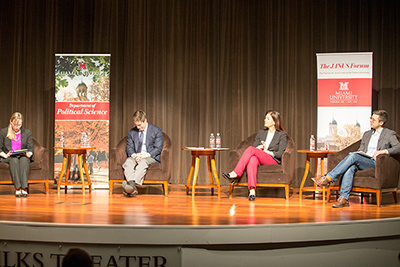Janus Forum poses the question: In the age of Trump, is the party over?

Written by Maia Anderson and Diego Marcucci, CAS communications interns
The Janus Forum, offered once each semester, held its 6th annual spring lecture on March 7, inviting students and faculty to discuss the American political parties and their changing roles and influences during the administration of Donald Trump.

Moderator Madeline Zick (left) introduces panel members (left to right) Jonathan Swan, Kelly Ayotte, and Ezra Klein.
Guest speakers Kelly Ayotte, a former U.S. senator from New Hampshire, Ezra Klein, founder and editor-at-large of Vox.com, and Jonathan Swan, a political reporter for Axios, answered debate questions set by the panel and took questions that were live-tweeted by audience members. The trio were intentionally chosen by the planning committee, run by students, in order to get a diverse array of viewpoints.
The presentation is meant to provide debate between members of the community with opposing views. This spring's forum was moderated by Janus president Madeline Zick, a senior political science and economics double major. She began the evening by asking the guest speakers for their perspective on the question: Are the American political parties as we know them now over?
Klein argued that party institutions are weaker today than they have ever been before. In his view, they have lost control over their central connotations and who carries the torch for them.
"The core fact of American politics right now is that we have weak parties and strong partisanship," he said.
Swan, an Australian native with a unique outsider perspective on American politics, said that it isn't the parties that are weak, especially compared to those in Australia, but the democracy and the operation of Washington that's broken.
"American parties are plenty strong, but the system is completely screwed up," he said.
Ayotte, who has colleagues currently serving as lawmakers and politicians, claimed that the polarization in America today is a reflection of the behavior in Washington between Democrats and Republicans. Both parties, she said, are in the mindset that the other side is at fault, and each looks at the other in a more negative light due to their differences.
The former senator also noted how much both parties have changed throughout the years, adding, "If we went back 50 or 60 years, I certainly never would have been chosen by my party."
When asked what creates this environment, her answer was simple: the media.
"People too often choose to consume only content which agrees with their personal beliefs, shielding themselves from opposing views," she said.

Students listen attentively as one of the panel members makes a point.
Klein believes that Trump is a profound accelerant of the cultural and political polarization seen today.
"Based off his rhetoric throughout his campaign and his presidency thus far, Trump is a culturally polarizing figure," Klein said.
As a reporter, Swan revealed that he has experienced first-hand the difficulties of covering the Trump administration. While he's trying to find answers to questions, he explained, there are figures on the outside and inside of the White House trying to feed him malicious information.
"And at the same time, Trump himself often doesn't know the answer to the questions being posed, creating further confusion," he said.
As for the future of American politics, Ayotte said Democrats are capable of taking over the House of Representatives, but she admitted to being wrong on the effects of Trump in the past. Klein agreed, saying that it's hard to predict what will happen in the next election because there is a multitude of things that could occur between now and then — and no one knows how the American people will respond to certain events.
Swan said that events like the Janus Forum are essential for a well-rounded education.
"When I was in college, it was always good to meet people who are practitioners, who do things you don't necessarily get exposed to everyday," said Swan. "I wish I encountered working journalists more when I was at university. Just to have that experience with people who are doing it day in and day out and not lecturing about it or theorizing about it, is just incredibly valuable."
The Janus Forum gives students studying political science a practical experience to meet and speak with people who work in and influence their future career field. Students in the audience voiced their appreciation for the opportunity to observe the discussion by such esteemed national figures.
"It adds a lot of value to my degree in political science, and a lot of my professors in classes respect that as well and give me a special opportunity to attend," said Brendan Greenlee, a senior political science major.
Senior marketing and political science major Paolo Federico-O'Murchu gave his thoughts on why discussions like the Janus Forum are important in college, at an age when many people's political minds have not necessarily been made up.
"It's still possible to change people's views more here, but the macro trends of American polarization I think definitely hold true," he said. "It's almost undoubtable at this point."
When asked about their thoughts on the speakers, both students seemed to agree that while they enjoyed all of them, Swan was the one that made the event most worthwhile.
"I think Swan really sold it for me,"said Greenlee. "He talked a big game and I think was able to follow it up."
The Janus Forum is sponsored by The Thomas W. Smith Project on Liberty, Democracy and Citizenship, the Miami University Department of Political Science and the Office of Diversity Affairs. The event is made possible by the support of The Thomas W. Smith (Miami '50) Foundation.

